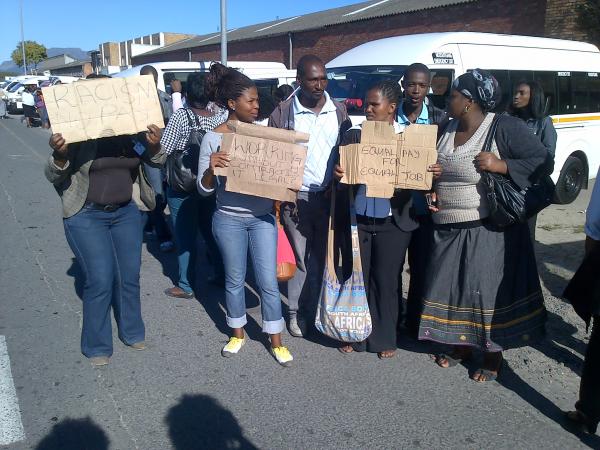

African employees have accused the company of racism. Photo by Mihle Pike.
23 January 2013
GroundUp journalist Mihle Pike received a call this morning that employees at Cash Paymaster Services had gone on strike. She went to see what was going on. Here is her account.
This morning at 5:30am, I received a call from one of the employees of Cash Paymaster Services that I interviewed for my article last week about the work conditions at this company. Cash Paymaster Services is contracted by the South African Government to manage the new social grant cards.
I arrived just before 6am at their offices in Landsdowne Road. Outside near the company’s entrance all the black African employees were standing. Across the road stood the Coloured employees. The African employees were striking, while it appeared that the Coloured employees were not. Some of the striking employees angrily told me that they were being called “Blackberries”. They singled out Sidwell Davids, a manager at the company, for making the most racist comments.
Davids then came to the gate and told the non-striking employees to come across the road and come into work. This they did. I overheard Davids say to one of the African employees who was striking, “Move away you fucking stupid.” I went close to Davids and introduced myself as a journalist. He pushed me, swore at me and said “Move away from here.” I thought perhaps he misheard me, so when the last non-striking employees had entered work, I went close to him to identify myself again. He told me to “fuck off”.
A security guard then closed the gate to the company’s offices. As he locked the gate, he said to me, “Last year the menu was all black. This year the menu is all brown.” He repeated this several times as angry striking workers asked him if he was serious.
The strikers protested and toyi-toyed outside the company. As reported last week, there are a number of grievances that employees have with the company, primarily that they are working without contracts. What appears to have triggered this morning’s wildcat strike is that some workers found that their security cards to get into work had been deregistered and some of the registers they have to sign to enter work have disappeared, with the implication that they are fired.
Eventually a manager came and said the strikers must send in two people to discuss the situation. The striking employees nominated a representative, Zicengile Nokhemana, to address management. After about five to ten minutes Nokhemana came back with a response. He said that the company asked them to go to the Social Services sites that they usually work at and return later in the day when Louis Grundlingh, the head of the company, would be back to listen their grievances. The striking workers refused to leave, because they were worried the company was deceiving them. About 45 minutes later, Grundlingh arrived. He walked over to the striking workers randomly chose two representatives and tried to convince them to convince the strikers to return to work and discuss their grievances later in the day. The strikers refused and insisted that Grundlingh come and listen to them.
Grundlingh came out. He pleaded with the crowd to go to work. He explained that people at the halls were calling radio stations to complain. He said, “You don’t want us to lose this tender [with the Department of Social Development], do you?” Some people recorded him speaking with their phones and he got upset, physically taking some of the phones away. He promised that the contracts were being sorted out. However, he insisted that contracts could only be for three months, which employees say is too short. Moreover many of them have been working since April 2012 for the company without contracts. Employees do get paid, even if they are not on contract, but they have complained that the working hours are illegal and that they are often not paid correctly.
At one point Grundlingh asked to meet me in private and said if I helped get people to go back to work, he would tell me everything in his office. I said, “I don’t have the power to do that,” and walked away.
The protest went on for three hours. Eventually some of the strikers agreed to work. Others went home. The strike dispersed.